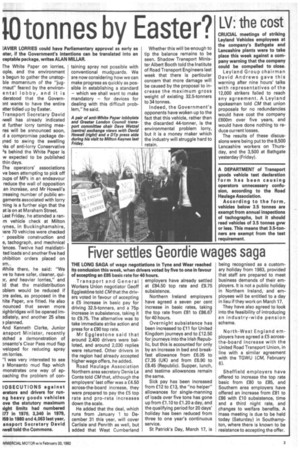Fiver settles Geordie wages saga
Page 3

If you've noticed an error in this article please click here to report it so we can fix it.
THE LONG SAGA of wage negotiations in Tyne and Wear reached its conclusion this week, when drivers voted by five to one in favour of accepting an £85 basic rate for 40 hours.
Transport and General Workers Union negotiator Geoff Egglesteme told CMthat the drivers voted in favour of accepting a £5 increase in basic pay for driving 32.5-tonners, and a 75p increase in subsistence, taking it to £9.75. The alternative was to take immediate strike action and press for a £90 top rate.
Mr Egglestone said that around 2,400 drivers were balloted, and around 2,030 replies were returned. Other drivers in the region had already accepted higher wage offers, he added.
Road Haulage Association Northern area secretary Denis Le Conte told CMthat, although the employers' last offer was a £4.50 across-the-board increase, they were prepared to pay the £5 top rate and pro-rata increases down the scale.
He added that the deal, which runs from January 1 to December 31 this year, will cover Carlisle and Penrith as well, but added that West Cumberland employers have already settled at £84.50 top rate and £9.75 subsistence.
Northern Ireland employers have agreed a seven per cent increase in basic rates, taking the top rate from £81 to £86.67 for 40 hours.
Overnight subsistence has been increased to Ell for United Kingdom journeys and to E12.50 for journeys into the Irish Republic, but this is accounted for only by an increase in bed and breakfast allowance from £6.05 to E7.35 (UK) and from £6.90 to £8.45 (Republic). Supper, lunch, and teatime allowances remain the same.
Sick pay has been increased from £12 to £13, the "no helper" allowances for single-manning of loads over five tons has gone up from £1.10 to £1.20 a day, and the qualifying period for 20 days' holiday has been reduced from three to one year's continuous service.
St Patrick's Day, March 17, is being recognised as a customary holiday from 1983, provided that staff are prepared to meet business demands of their employers. It is not a public holiday in Northern Ireland, and employees will be entitled to a day in lieu if they work on March 17.
They have also agreed to look into the feasibility of introducing an industry-wide pension scheme.
North-West England employers have agreed a £5 acrossthe-board increase with the United Road Transport Union, in line with a similar agreement with the TGWU (CM, February 6).
Sheffield employers have offered to increase the top rate basic from £80 to £85, and Southern area employers have offered an increase from £81 to £86 with £10 subsistence, time and a third night rate, and changes to welfare benefits. A mass meeting is due to be held today (Saturday) in Southampton, where there is known to be resistance to accepting the offer.


















































